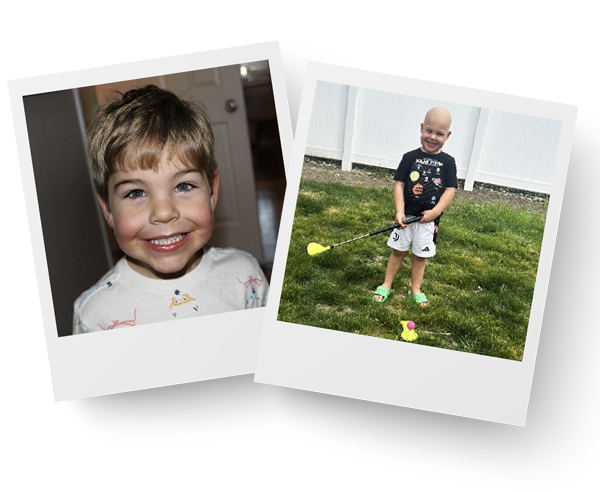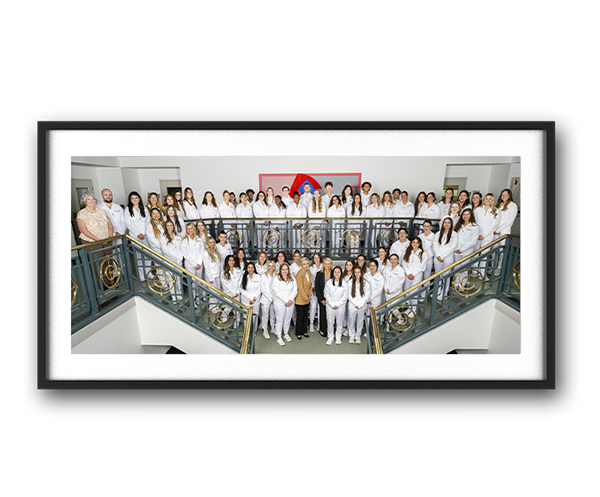A Parent’s Instinct and a Hospital’s Expertise

Like many 5-year-old boys, Nolan Pinson is always on the move, with special zest reserved for Legos, trucks, and playdates. But his big blue eyes and million-dollar smile barely hint at the fact that sets him apart from most of his peers: On Jan. 9, 2024, Nolan received a diagnosis of B-cell acute lymphoblastic leukemia, or ALL. He has been receiving treatment at Cleveland Clinic Children’s ever since.
While rare, ALL is the most common form of childhood cancer, an aggressive type of blood cancer in which too many immature white blood cells are found in the bone marrow and blood. Symptoms can include anemia, cough, bruising and fatigue. Nolan’s parents, Megan and Max Pinson, first noticed something was off when he was about 4-and-a-half years old.
“The immediate symptoms were fatigue and lethargy,” says Megan, coupled with what seemed to be a cold and fever. A test for RSV was positive but Nolan didn’t seem to be improving with treatment.
“You know, this is a little boy who had been extremely healthy up to this time,” Megan says. “And he just didn’t seem to be bouncing back.”
Beyond the Typical Childhood Illnesses
Over the course of the next four weeks, Nolan’s doctors searched diligently for an explanation. But by that point, Megan and Max were already beginning to suspect that his symptoms were caused by something beyond the typical childhood illnesses. “Parents just know their child,” Megan says, “and deep down you can just kind of tell if something else is going on.” Once all the usual explanations had been ruled out, Nolan’s pediatrician ordered a blood test.
The Pinsons received the phone call the next day: The blood test had revealed dangerously low levels of hemoglobin and platelets, and the family was instructed to take Nolan straight to the emergency department.
“The following day,” Megan recalls, “they did a lot of additional tests, and on Jan. 9, they confirmed that Nolan had leukemia.” Treatment at Cleveland Clinic Children’s began two days later.
While ALL is a serious condition and requires years of chemotherapy, kids generally have a positive prognosis. In fact, studies show that more than 95% of children with ALL will have complete remission after chemotherapy and those who remain in complete remission after five years can be considered cured. In Nolan’s case, his test results support the likelihood of a good outcome.
Still, the road toward recovery has been rough. To begin with, Megan says, the simple fact of receiving Nolan’s diagnosis was devasting. “As parents, you go through all these feelings of shock, grief and anger – and I don’t think those will ever go away,” she says.
The duration of treatment also seemed overwhelming. “It certainly caught us off guard,” Megan says. “You’re given the diagnosis and you’re given this great prognosis and told how treatable ALL is. And then the next thing you know, you’re handed a treatment plan for the next two years, right? Like, if it’s so treatable, why is the treatment so long?”
But, she adds, she now understands the reasoning. “The doctors told us that leukemia is ‘sneaky.’ And while kids tend to go into remission quickly, there can be what they call MRD, or minimal residual disease, which can come back later.” As a result, Megan explains, one of goals of long-term treatment is fully eradicating the disease and eliminating any possibility of MRD.
An Age-Appropriate Explanation
Meantime, Nolan has lost his hair and missed months of school, as well as birthday parties, play dates and travel. Explaining all this to him in an age-appropriate way has been challenging, Megan admits. “He’s a very perceptive and very curious little boy, and he’s been very interested in understanding how he got sick. We’ve answered that no one knows why, but his medicine and treatment are working to make him better.”
Nolan’s recent interest in “Star Wars” has also provided a conversational entry point. “We’ve told him that his treatment is like body armor,” Megan says, “and it will help protect him in the future!”
In addition to receiving chemotherapy, Nolan is enrolled in a National Cancer Institute study of a medication that may induce changes to his immune system and interfere with the ability of cancer cells to grow and spread. The medication is delivered around the clock by way of a subcutaneous port; the necessary apparatus is kept in Nolan’s backpack. Here again, the 5-year-old’s interest in action and adventure tales proved a plus: That backpack is now known as his “jetpack.”
Despite the challenges of the family’s journey with ALL, one thing has remained certain: Cleveland Clinic Children’s was the right choice for treatment.
In fact, it only seemed natural – Megan’s father is a Cleveland Clinic physician, and her mother is a Cleveland Clinic nurse, a reality that lent a degree of comfort to a difficult situation. Still, Megan says, she doesn’t think her parents’ roles at Cleveland Clinic made much of a difference in their experience. “I think we would have been treated the same regardless of our connections, although we never considered going anywhere else.”
She and Max stand by that decision to this day. “The level of care and attention to detail we’ve received at Cleveland Clinic Children’s have been second to none,” says Max. “From day one, every step of the way, the communication has been wonderful and we’ve felt very well taken care of, as a family.”
That includes receiving “tons” of support, empathy and encouragement from the staff, adds Megan. “One of the things you wrestle with is that leukemia is so treatable and the prognosis is so good – but getting that cancer diagnosis is still devastating and the staff never tried to minimize that. They never forced us to feel optimistic when we didn’t.”
Grateful for an Experienced Care Team
Both Max and Megan have been especially moved by the relationship they’ve built with nurse care coordinator Lynn Butler, RN.
“I really don’t think we could have gotten through this without Lynn,” says Max. “If you consider this experience as the emotional equivalent of climbing Mt. Everest – which it has felt like, at times – Lynn was our sherpa: She got us up that mountain. Obviously, the entire oncology team has a great deal of medical experience, but Lynn went above and beyond, holding our hand every step of the way, helping us understand all the medical jargon and connecting with us in a very human, very ‘real’ way. Throughout Nolan’s treatment, she’s been our translator, our therapist and our guide.”
One interaction in particular stands out, Megan says. “We were in the hospital early on, just trying to wrap our heads around which way was up, and Lynn said something I will always remember. ‘This is the worst day of your life,’ she said. ‘Short term, it changes a lot. But long term, it changes nothing. You will adjust to the new normal, you will still be able to celebrate all the milestones that you’ve been looking forward to and you’ll still be raising Nolan to be exactly who he was meant to be.’
“There was a realness to that,” Megan says, “and a comfort.”
Max and Megan also point to Nolan’s pediatric hematologist-oncologist, Jamie Shoag, MD, for her guidance, expertise and constant availability, as well as the hospital’s child-life specialists, who consistently provided relatable, age-appropriate support. “Art therapy, music therapy, facility dogs: They really do their best to offer support and to normalize the hospital experience. Days at the Clinic that seemed long and hard to us, Nolan just remembers the fun he had building Legos with his therapist.”
Now about nine months into his treatment plan, Nolan’s life is slowly regaining a degree of normalcy. Much to his delight, he began kindergarten in August and the family hopes to soon plan a visit to beloved cousins in Minnesota.
“Progress is never linear,” Megan admits, “but we have the sense that we’ve gotten through the worst of it.”
Max agrees. “We’re not the first, and I recognize we won’t be the last, family to go through this,” he says. “But we are optimistic that all the families still to come will receive the same wonderful care that we have. I can honestly say we feel super fortunate to be living in Cleveland and to have such a great medical team behind us.”
“We’ve had a wonderful experience at Cleveland Clinic Children’s,” Megan sums up. “At this point, we’re feeling hopeful.”
Nursing Mentorship Program Inspires Career Confidence

Identifying exceptional nurses and nurturing them early in their careers is a top priority at Cleveland Clinic. Nurses provide around-the-clock care to patients all the while answering family members’ questions and easing their worries. They have a wide range of responsibilities, including assisting with activities of daily living, administering medications, and monitoring signs and symptoms of various disease processes.
Nurses work alongside physicians and support staff to provide the best quality and most effective care possible. In today’s fast-paced healthcare environment, it is imperative that nurses make informed decisions, analyze complex situations and effectively use technology in their practice. It is truly a collaborative effort with multiple departments working together seamlessly to manage every aspect of the patient’s healing journey. This significant responsibility requires extensive knowledge, skill and compassion, often proving to be quite daunting for a new nurse.
That’s why leadership in the Stanley Shalom Zielony Institute for Nursing Excellence at Cleveland Clinic launched the Nurse Associate Externship program 10 years ago. This immersive, 10-week summer program pairs students with a seasoned RN mentor so they may apply their textbook knowledge in a real-life environment. Nurse Associates earn pay and join their mentors on 8- to 12-hour shifts to sharpen their critical-thinking skills.
“Every nursing student should be able to experience an externship like this because it not only gives you the opportunity to learn, but it allows you to get additional hands-on experience,” says Cassandra Holman, RN, who was a nurse associate extern on a medical-surgical/telemetry unit at Cleveland Clinic Avon Hospital in 2023. "Everything our externs learn can be used in their clinical rotations and carried forward long into their nursing careers.”
In July and August, the nursing institute celebrated over 150 participants from Cleveland Clinic Main Campus, our regional hospitals and Cleveland Clinic Florida. To date, nearly 850 nursing students have engaged in this highly coveted program. Each year, high-performing externs are invited to apply for permanent positions at Cleveland Clinic.
“After the externship, participants are stronger and more confident in their skills because they experienced continuity on the clinical floor and know what it’s like to work a full shift,” says Jeanne Henry, MEd, BSN, BS, RN, Nurse Associate Externship lead. “They experience interdisciplinary collaboration and collective decision-making while learning the value of resources and teamwork.”
These educational opportunities give future healthcare providers from outside the organization the chance for career exploration and navigation at Cleveland Clinic. With support from philanthropy, the Nurse Associate Externship program will continue to expand and ensure future healthcare workers feel empowered to step onto the floor after graduation.

